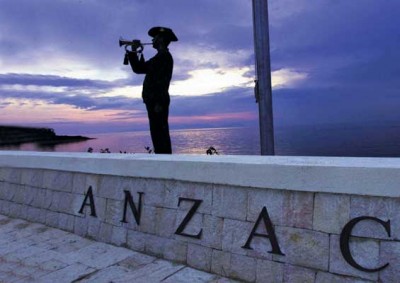Branding War in Australia: Anzac Vulgarity and the Cult of Austerity

“I found the Woolworths campaign to be vulgar, but to be honest I didn’t find it more distasteful and vulgar than a lot of other things which are going on in terms of commercialisation of Anzac and the use of the Anzac brand.” These are the chosen words of former policy advisor to Australia’s Department of Prime Minister and Cabinet Carolyn Holbrook on ABC’s 7.30 program.[1] Anzac, the name associated with Australian soldiers who found themselves on Turkish beaches in April 1915 as part of Winston Churchill’s disastrous Dardanelles campaign, has become “Brandzac” over the years, a cavernous money pit of opportunity.
That pit is a means to capitalise on solemn occasions which insist on crass adventure and relaxation. For the supermarket giant Woolworths, the slogan “Fresh in our Memories” was found wanting, marketing sprightly food produce alongside memories of Australia’s dead. Purchase your regular round of fruit and veg, and keep the fallen at the forefront of your mind. You, dear customer, will remember them.
Woolworths is hardly more questionable in its tactics than companies who market war for profit, seeing humankind’s perennial love of massacre as a business opportunity. Brewing companies urge their customers to raise a toast to the soldiers. Shirts, handbags and hats can be bought with an assortment of logos. Purchasing poppies for the cause is encouraged. In Anzac’s Long Shadow: The Cost of Our National Obsession (2014), James Brown noted that, “a century after the war to end all wars, Anzac is being bottled, stamped and sold.”
It was ever thus. Blood translates into money with ease, and the “digger myth” was always a lucrative standard to aim for. Some months after the first Australians and New Zealanders fought at Gallipoli, food stuffs and other items found their way onto the market. This prompted the regulators to get busy, prohibiting the use of “Anzac” for “the purposes of any trade, business, calling, or profession”.[2]
The entire basis of Anzac is both a sentimental and commercial industry, whether it is initiated through maudlin state-directed enterprise, or the private sector. The cultists of austerity, however, would wish to see it controlled by the long hands of government. They would prohibit such images as that of a well-endowed Anzac poster girl holding a weapon and kneeling in khaki latex. “I just thought that was basically Anzac porn, a new low in the commercialisation of Anzac,” fumed Holbrook.
All wars see instances of pornographic fancy, fashioning images to soften the home front while savaging the enemy. Tits, bums and ravished nuns have seen their place. The brandzac critics inadvertently tend towards a distinct brand themselves. Since states maintain sacred prerogatives of killing and sending citizens to be killed, it should hold a monopoly on sanguinary commemoration. They will be the judges.
In line with such views, Woolworths was ultimately told to abandon a campaign deemed “inappropriate”. The Minister for Veterans’ Affairs, Senator Michael Ronaldson, asserted that the company “did not have permission” to milk the Anzac milch cow. They might have done the good thing and asked.
Showing how the language police are in full swing, Senator Ronaldson reminded the company that, under the Protection of the Word Anzac Act, he “got to authorise the use of the word Anzac”, something that was not allowed for purely commercial benefit.[3] This absurd pantomime has continued for decades – commercial benefit is dandy as long as it has ministerial blessing.
A range of penalties exist for misusing the name. For an individual, it comes to a hefty $10,200. For corporations, it’s five times that amount. And there is a peculiar yet brutal 12 months imprisonment in the bargain. While Anzac involves much disingenuous dribble on the issue of protecting some form of freedom, one earned by invading and killing the darker members of the human race, it is striking that liberty should be removed on the chance that the name was “misused”.
Other features of the regulatory mania over the word “Anzac” can be found in the guidelines of the Department of Veterans’ Affairs. “Anzac biscuits” with the approved recipe receive the nod of approval. The same goes for the “Anzac Slice”. However, making reference “to these products as ‘Anzac Cookies’ is generally not approved, due to the non-Australian overtones.”[4]
The Spartan defenders of the Anzac creed insist, instead, on a near incapacitating, high priest veneration. What this involves is not clear, but presumably standing before the eternal flame in misty-eyed adoration about feats of heroism in the slaughterhouse might count. We should all be Anzac subjects rather than cognisant citizens suspicious of warmongering.
The birth of the Anzac tradition did involve slaughter and defeat. But it was a defeat received in the context of invasion, an attack on Ottoman Turkey that was fought back at huge cost to human life. Few accounts ever bother about the obvious: that Australian soldiers performed what they have been doing decades before and since: invade a sovereign state in the name of some higher moral value, and clothe it in the fluffy reassurance of imperial virtue.
The Anzac legend, like all legends, is there to be vulgarised. In its true, original sense, the common meaning of it is that held by the common people. It is, as Brown has observed, a “military Halloween” equipped with absurd masks and retellings, pilgrimages and military tourism. Anzackery is merely the outcome of yet another zombie myth of Australian military history.[5]
Dr. Binoy Kampmark was a Commonwealth Scholar at Selwyn College, Cambridge. He lectures at RMIT University, Melbourne. Email: [email protected]
Notes:
[1] http://www.abc.net.au/news/2015-04-15/critics-disgusted-by-vulgar-commercialisation-of-anzac-day/6395756
[2] http://trove.nla.gov.au/ndp/del/article/2098132
[3] http://www.abc.net.au/news/2015-04-15/rsl-responds-to-woolworths-fresh-in-our-memories-campaign/6393498
[4] http://www.dva.gov.au/commemorations-memorials-and-war-graves/protecting-word-anzac
[5] http://www.amazon.com/Zombie-Myths-Australian-Military-History/dp/1742230792

